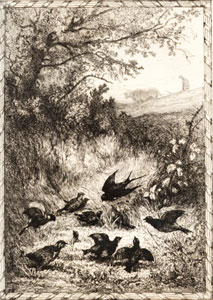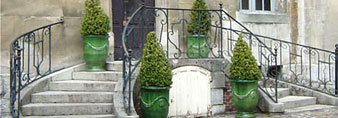THE EYE OF THE MASTER (IV, 21)
A stag look refuge in an oxen-stall,
But soon they told him that their hall
Was hardly a safe place to stay.
“ Don't give me up,” he said, “ I pray ;
I'll show you where the fattest pasture lies,
A service you another day may prize.
You won't regret it, I surmise.”
They promised secrecy the most profound.
He gained a corner, breathed, and courage found.
They came at evening with their grass and hay,
According to their custom every day—
And up and down the place the clowns had been,
The very overseer came that e'en,
But not a horn nor antler then was seen,
Nor stag. The ranger of the forests free
Now thanked the oxen, waiting but to see
The men return to Ceres' smiling plain,
When he might happily escape again.
“ ’Tis well,” a ruminating ox now cries ;
“ But stop,—our master, with his hundred eyes,
Has yet to hold his keen review ;
’Tis that, poor stag, I fear for you !
Nor think, till then, your hopes are fully crowned. ”
On this the master entered, went his round :
“ How's this, my boys ? ” he to his servants cried,
“ These racks with hay so scantily supplied ;
Fly to the loft, and change this filthy litter,
Henceforth I’ll see my cattle treated better,—
And sweep these spiders and their webs away,
In order all these yokes and halters lay.”
He saw another head, in looking round,
Than in the stall was generally found.
Too soon was recognised the trembling deer,
Each fell upon him with his long boar-spear
His pleading tears availed him not the least ;
They take him, salt him, dress the wretched beast,
And many a neighbour shares with joy the feast. Phœdrus, on this, most elegantly says,
The master's eye the best surveys.
But I prefer the lover's piercing gaze. |
| |

|
THE LARK, HER YOUNG AND
THE MASTER OF THE FIELD |
|
THE LARK, HER YOUNG AND
THE MASTER OF THE FIELD (IV, 22)
Depend upon yourself, the proverb says,
Ǽsop thus gave it lustre in his days :
The larks among the corn are seen,
Building their nests while it is green,
That is to say, about the time
When all is love, and fruitful in our clime ;
Huge monsters courting in the watery main,
Tigers in woods, and songsters on the plain.
And yet a lark, we know net why,
Had nearly let the spring go by,
Nor sipped the sweets that season gives,
When all things love, and nature lives.
By nature prompted, with good-will
She tried to be a mother still.
She built, laid, sat, and hatched her nest,
And everything went for the best.
Ripe was the corn that round her children lay,
Ere they could rise and wing away.
A thousand cares perplexed the mother's breast,
She went in search of food, but warned them well
To watch with care, and play the sentinel.
“ And should the farmer, with his son,” she said,
“ Come here when I'm abroad, as I’m afraid,
Listen with care ; for just from what they say,
Will we decamp, or longer stay.”
Soon as the lark had left her tender care,
The farmer with his son came there :
“ The corn is ripe,” he cried, “ without delay
Go, ask our friends to help to-morrow, pray ;
Each with his sickle here by break of day.”
The lark came home, and free from harm,
Yet found her nest in great alarm.
Says one : “ He told his son by early morn
To bring his friends to help to cut the corn ! ”!
“ If that is all he said,” returned the lark,
“ Nothing yet hurries us from our abode ;
But carefully to-morrow you must hark—
Meantime, be cheerful—there's abundant food.”
All fed, and slept, the mother and her brood.
Daybreak appeared, but not a friend was found.
The lark sprang up, the farmer went his round.
“ This corn, ” he cried, “ must now no longer stand ;
Our friends are wrong, as we that trust their word,
They are too lazy with their helping hand.”
But greater fear seized every tender bird,
When thus the farmer's voice fell on their ear.
“ Haste then, my son, bring our relations here.”
“ Relations, mother, now are called, ” they said.
The lark replied : “ My children, go to bed ;
Let us not stir, relation's but a name ”
The lark was right, for not a person came.
The owner viewed again his corn ere long ;
“ My son,” he cried, “ we are extremely wrong
To think that other folks for us will strive.
Trust to yourself, boy, that's the way to thrive ;
Best friend who helps himself, mind what I say.
And now, in order to get through,
I tell thee, lad, what we must do :
To-morrow, at the peep of day,
Let all our family bring their hooks,
And fall to work with cheerful looks ;
It is by far the shortest plan,
And we'll get through it when we can
The lark exclaimed, when this design was known,
“ Make haste, my darlings ! let us now begone ! ”
They fluttered o’er each other on their way,
And witout trompet-blast decamped that day. |
|



